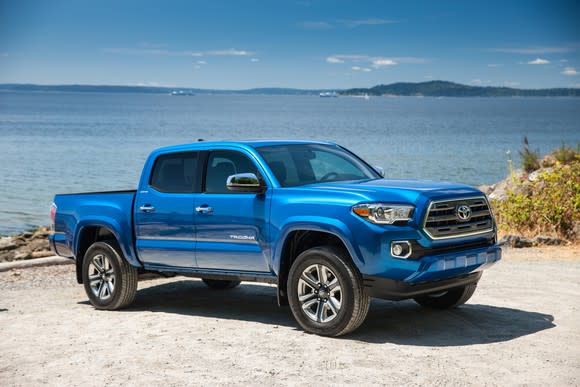Ford Keeps Losing Market Share in the U.S. -- but That's OK
Last week, Ford Motor Company (NYSE: F) reported that its U.S. vehicle deliveries slipped 3.9% in October. While that was a slightly better result than what analysts had expected, the U.S. market as a whole posted flattish sales for the month.
In other words, Ford continued to lose market share last month. This news halted a recent Ford stock rally in its tracks. But while the Blue Oval could continue to see its domestic market share trend lower over the next year or so, investors shouldn't be too concerned. The new and updated crossover, SUV, and truck models it is bringing to market between now and early 2020 will eventually stabilize its sales and dramatically improve its profitability.
Ford deliveries slip again
Ford's U.S. deliveries totaled 192,616 last month, down from 200,436 in October 2017. Lower sales of the company's best-selling F-Series trucks drove a large piece of the decline. F-Series deliveries totaled 70,438 in October, down from 75,974 a year earlier. Yet that's still an incredibly strong sales performance by historical standards. The decline can probably be explained by a combination of inventory still being tight due to a fire at a supplier facility in May and competition from upgraded trucks at Fiat Chrysler (NYSE: FCAU) and General Motors.

Ford's F-Series truck deliveries slipped last month. Image source: Ford Motor Company.
On the flip side, sales of crossovers and SUVs surged 6.7% for the company as a whole, and 7.9% for the Ford brand in particular. Demand for the full-size Ford Expedition and Lincoln Navigator SUVs remains red-hot, with sales of both models up at least 70% year over year. The new Ford EcoSport subcompact SUV also continued to gain traction.
These gains in the crossover/SUV market were more than offset by a 17.1% plunge in Ford's passenger car sales. Cars have now fallen to less than 20% of the sales mix at Ford.
Rivals are catching up
While Ford's delivery total continued to sink last month, deliveries increased at Toyota Motor (NYSE: TM) and Fiat Chrysler, the No. 3 and No. 4 automakers by U.S. market share, respectively.
Toyota delivered 191,102 vehicles in the U.S. in October, up 1.4% year over year. Sales of Toyota-branded cars fell 8.6%, but Toyota more than made up for it with a 6.7% increase in crossover/SUV sales -- driven primarily by the popular Toyota Highlander -- and a 29.9% surge in deliveries of the Toyota Tacoma midsize pickup.

Toyota's Tacoma midsize pickup truck sold very well last month. Image source: Toyota.
Meanwhile, Fiat Chrysler continued its recent string of strong sales gains. Domestic deliveries surged 15.7% to 177,391 units. Once again, the Jeep brand performed well, with sales up 9%. Ram pickup deliveries surged 11% on the back of strong retail demand for the all-new Ram 1500 -- although with 49,186 pickup deliveries, Ram still lags Ford's F-Series line by a wide margin.
Somewhat surprisingly, the Chrysler and Dodge brands also posted strong gains last month. But this may have been driven by the timing of fleet deliveries. Fiat Chrysler's fleet sales jumped more than 50% last month, from 23,220 to 36,191 units.
The transition away from cars will create more headwinds
Toyota very nearly overtook Ford for the No. 2 market share position in October. Fiat Chrysler isn't far behind -- especially when you consider its strong sales momentum. Indeed, it wouldn't be surprising if Ford falls all the way to fourth place at some point in 2019.
The main reason is Ford's decision to phase out all of its traditional passenger cars over the next couple of years. It stopped building the Ford Focus months ago, and dealers are steadily selling down the rest of their inventory. Production of the Taurus and Fiesta models is scheduled to end next spring, followed by the Ford Fusion at some point in 2020 or perhaps 2021. Adding to the headwinds, Ford has ended all national advertising for its traditional cars.
Considering that the Fiesta, Focus, and Taurus still accounted for 6.5% of Ford's deliveries last month, investors can expect more sales declines in the months ahead. (The end of national marketing for the Fusion won't help, either -- that model outsold the other three sedans combined in October.)
However, while Ford may continue to lose market share, it's not making money on its passenger cars, so profitability should improve. Furthermore, it should eventually be able to reclaim some of this market share as new models arrive. The reintroduction of the Ford Ranger in early 2019 will help, but the real tipping point could come later in 2019 when Ford rolls out all-new versions of its high-volume Escape and Explorer crossover models.
The Ford Bronco and another off-road SUV will come later and add further momentum to Ford's rejuvenated product lineup. All of these models should be far more profitable than the sedans they are replacing. In the short term, there may be more pain coming for Ford, but that doesn't make the automaker's future any less bright.
More From The Motley Fool
Adam Levine-Weinberg owns shares of Ford and General Motors. The Motley Fool recommends Ford. The Motley Fool has a disclosure policy.

 Yahoo Finance
Yahoo Finance 